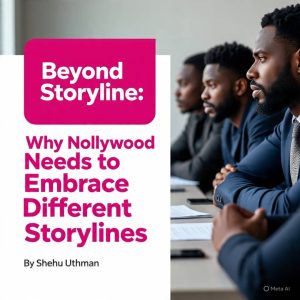Shehu Uthman

It’ll not be fair to the Nollywood industries to blame them for not embracing multifarious story telling. In fact, every industry or business seeks to major on what makes them thrive more—same applicable to the Nollywood industries—they seek not to embrace multifarious ideas probably because they feel like the audience like seeing the same faces.
However, this is not always the case, Nollywood’s action of not embracing multifarious ideas can be too boring, because the audience cannot seem to be watching the same story idea all-over-again. So, I believe that if Nollywood could allow different people from different metropolis who have skills and dexterity embedded in them to partake and showcase such talents, a profuse achievements and values will be created in the Nollywood industry, providing a room for better plotlines and depicting cultures of people in a profound manner as an entertainment that resonate with the expectations of the audience. This will curtail the problem of seeing the same faces All-over-again on the watch screen.
Also, Nollywood as the second largest industry in the world has much to offer—and grows more than it is now. What a success it would be if the managers of the Nollywood industry would consider 70% of the different ethnic groups comprising talented, capacitated, and dexterous personalities who can contribute profusely, whether in writing, storytelling, performance in theatre, or even decision-making, to take the industry to its peak: the highest level in terms of prosperity and awareness. If the aforementioned suggestion is utilized, it means that Nollywood would be representing and entertaining the country at large by depicting all Nigerian cultures.
Imagine Nigeria as a country whose citizens, at large, watch films produced from a particular industry, exhibiting traditions of the nation, regardless of whether the audience are from major or minor ethnic groups. What harmony! Through fair representation and entertainment.
What if this encompassed not only Nigerian writers, storytellers and stage performance on theatre but also dexterous personalities or individuals outside Nigeria within Africa. In this sense, what will be the fate of the Nollywood Industry? Definitely, that will be a new milestone in the history of Nollywood Industry because people from different countries will take Nollywood films as their favourite films whereby, experienced people from different countries converge to share their stories, and writing skills and knowledge on how the films will not only attract but also at the same time depicts cultures and traditions of people from various countries.
Moreover, engaging people from different cultures and countries as runners of nollywood programmes brings about innovation through fresh voices. What this portrays is that, diverse storytelling can help audiences connect with the characters and the stories from different backgrounds, ensuring comfortability while watching a movie or film.
Moreso, it promotes collaboration, support, understanding and tolerance within the forum, making the team of workers and the industry at large unique, in order to scale through and be at peak within the competing film industries. Meanwhile, allowing those involved to showcase their experiences and perspectives.
Furthermore, by embracing diversity, nollywood can differentiate itself from other film industries in providing or establishing a unique niche not only in Africa but globally. In all honesty, Nollywood has been advancing and progressing so far because it uses the English language to tell stories of some cultures and most understand the English language. However, one of the lapses of nollywood industry is that it focuses on two major cultures in Nigeria: Igbo and Yoruba cultures while abandoning others aside.
Personally, as a case of study, I’m born by Hausa Fulani (Pullo) and atimes feel so bad watching films everyday that depicts other people’s culture and not mine, why only Igbo and Yoruba cultures? This is time for Nollywood Industry coordinators to revolutionize their thinking by embracing cultures in diversity, so that we all can learn our cultures easily. The advantage of this is that even those that are not privileged to domicile or stay within their community will definitely learn their culture through nollywood plays as we all know that cultures are not static but rather dynamic. More sense would be made if the aforesaid industry will go beyond deploying and displaying Igbos and Yorubas traditions and usages only.
In conclusion, depicting plays and stories beyond Yorubas and Igbos cultures open room for thousands of people to like and keep watching nollywood movies thereby, allowing others from different countries to also engage in the same.
